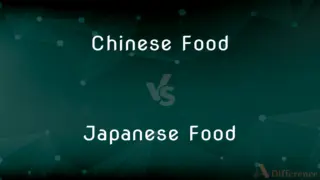Flavor vs. Flavour — What's the Difference?
By Tayyaba Rehman — Updated on August 24, 2023
"Flavor" is the American spelling and "flavour" is the British spelling; both refer to the taste of something.

Difference Between Flavor and Flavour
Table of Contents
ADVERTISEMENT
Key Differences
"Flavor" and "flavour" both describe the particular taste of a food or drink. The key difference lies not in their meaning, but in their regional usage. "Flavor" is the preferred spelling in American English, whereas "flavour" is the standard in British English.
If you're reading a recipe or an article on culinary techniques written by an American author, you're more likely to encounter the term "flavor." Conversely, British cookbooks, articles, or television shows will predominantly use the term "flavour."
While the difference in spelling is geographically based, in a globalized world with the internet blurring borders, it's not uncommon to find "flavor" used on a British site or "flavour" on an American one. Still, it's crucial for writers and editors to be consistent with one spelling or the other within a particular document or publication.
When one speaks of "flavor" or "flavour" outside the culinary context, they can also refer to the characteristic quality of something or a distinctive appeal. Regardless of the spelling, the underlying essence of the term remains consistent across both American and British English.
Comparison Chart
Regional Usage
Used in American English.
Used in British English.
ADVERTISEMENT
Meaning
The taste of something.
The taste of something.
In Cookbooks
Found in American cookbooks.
Found in British cookbooks.
Non-culinary Usage
Can refer to a distinctive quality or appeal.
Can refer to a distinctive quality or appeal.
Consistency
Important to maintain consistency in usage.
Important to maintain consistency in usage.
Compare with Definitions
Flavor
The distinct taste of a food or drink.
The ice cream had a rich vanilla flavor.
Flavour
The sensation produced by a substance on the taste buds.
The tea had a robust flavour of mint.
Flavor
A variety of something.
Our app comes in several flavors to suit different users.
Flavour
Variant of flavor.
Flavor
The essence of a thing.
The decor added a flavor of the Mediterranean to the room.
Flavour
The general impression or effect of something.
The novel had a flavour of mystery and intrigue.
Flavor
The nature of something's character.
The movie had a dark flavor to it.
Flavour
A particular quality or atmosphere.
The town has a distinct old-world flavour.
Flavor
A substance added to food to give it a particular taste.
He added some flavor to the dish using spices.
Flavour
A type or variety of something.
There are many flavours of this software available.
Flavor
To give flavor to.
Flavour
Standard spelling of flavor#Noun
The flavour of this apple pie is delicious.
Flavour was added to the pudding.
What flavour of bubble gum do you enjoy?
The flavour of an experience.
Debian is one flavour of the Linux operating system.
Flavor
Flavor, or flavour, is the perceptual impression of food or other substances, and is determined primarily by the chemical senses of the gustatory and olfactory system. The "trigeminal senses", which detect chemical irritants in the mouth and throat, as well as temperature and texture, are also important to the overall gestalt of taste perception.
Flavour
Standard spelling of flavor#Verb
Flavor
Distinctive taste; savor
A flavor of smoke in bacon.
Flavour
The general atmosphere of a place or situation and the effect that it has on people;
The feel of the city excited him
A clergyman improved the tone of the meeting
It had the smell of treason
Flavor
A distinctive yet intangible quality felt to be characteristic of a given thing
"What matters in literature ... is surely the idiosyncratic, the individual, the flavor or color of a particular human suffering" (Harold Bloom).
Flavour
(physics) the kinds of quarks and antiquarks
Flavor
A flavoring
Contains no artificial flavors.
Flavour
The taste experience when a savoury condiment is taken into the mouth
Flavor
Any of six types of quark (down, up, strange, charm, bottom, top), distinguished by generation, electric charge, and mass.
Flavour
Lend flavor to;
Season the chicken breast after roasting it
Flavor
Any of six types of lepton (electron, electron neutrino, muon, muon neutrino, tauon, tau neutrino), distinguished by generation, electric charge, and mass.
Flavour
An indication of the essential character of something.
His comments had a flavour of sarcasm.
Flavor
(Archaic) Aroma; fragrance.
Flavor
The quality produced by the sensation of taste or, especially, of taste and smell in combined effect.
The flavor of this apple pie is delicious.
Flavor
A substance used to produce a taste. Flavoring.
Flavor was added to the pudding.
Flavor
A variety (of taste) attributed to an object.
What flavor of bubble gum do you enjoy?
Flavor
The characteristic quality of something.
The flavor of an experience
Flavor
(informal) A kind or type.
Debian is one flavor of the Linux operating system.
Flavor
(particle physics) One of the six types of quarks (top, bottom, strange, charmed, up, and down) or three types of leptons (electron, muon, and tauon).
Flavor
(archaic) The quality produced by the sensation of smell; odour; fragrance.
The flavor of a rose
Flavor
To add flavoring to something.
Flavor
That quality of anything which affects the smell; odor; fragrances; as, the flavor of a rose.
Flavor
That quality of anything which affects the taste; that quality which gratifies the palate; relish; zest; savor; as, the flavor of food or drink.
Flavor
That which imparts to anything a peculiar odor or taste, gratifying to the sense of smell, or the nicer perceptions of the palate; a substance which flavors.
Flavor
The general atmosphere of a place or situation and the effect that it has on people;
The feel of the city excited him
A clergyman improved the tone of the meeting
It had the smell of treason
Flavor
(physics) the kinds of quarks and antiquarks
Flavor
Lend flavor to;
Season the chicken breast after roasting it
Flavor
That quality which gives character to any of the productions of literature or the fine arts.
Flavor
To give flavor to; to add something (as salt or a spice) to, to give character or zest.
Flavor
The taste experience when a savoury condiment is taken into the mouth
Common Curiosities
And where is "flavour" the preferred spelling?
"Flavour" is the preferred spelling in the UK and its former colonies.
In which country would I find "flavor" more commonly used?
"Flavor" is predominantly used in the United States.
How about "flavour"? Can it be used outside of a culinary context?
Absolutely, "flavour" can also describe the characteristic quality or atmosphere of something.
Does "flavour" have the same connotation?
Yes, "flavour" can similarly describe a variety or type, like in "different flavours of experiences."
Are "flavor" and "flavour" synonyms?
Yes, they mean the same thing, but their spelling differs based on American vs. British English.
If I'm writing for a global audience, which spelling should I use?
Choose based on your target audience or the style guide you're following, but be consistent.
Can "flavor" refer to something other than taste?
Yes, "flavor" can also describe a distinctive quality or nature of something.
What's the primary difference between the two words?
The main difference is regional spelling: "flavor" is American, and "flavour" is British.
Can "flavor" also mean a variety or type of something?
Yes, like in the phrase "different flavors of software."
Can I interchangeably use both spellings in a single document?
It's best to stick to one spelling for consistency in any given document.
Share Your Discovery

Previous Comparison
Gentlemen vs. Gentleman
Next Comparison
Manor vs. MannerAuthor Spotlight
Written by
Tayyaba RehmanTayyaba Rehman is a distinguished writer, currently serving as a primary contributor to askdifference.com. As a researcher in semantics and etymology, Tayyaba's passion for the complexity of languages and their distinctions has found a perfect home on the platform. Tayyaba delves into the intricacies of language, distinguishing between commonly confused words and phrases, thereby providing clarity for readers worldwide.
















































